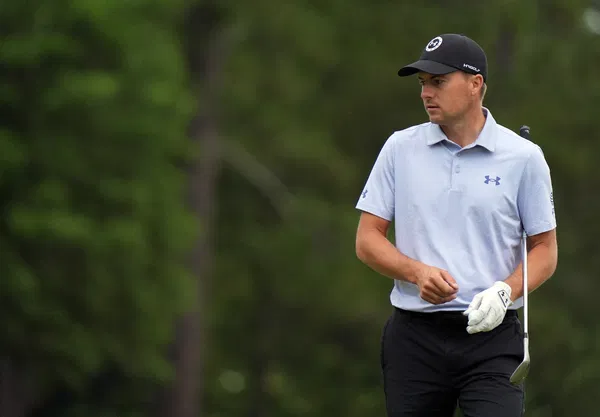Jordan Spieth Missing Out on $20M Was the Best Thing for Him; Here’s Why

Jordan Spieth’s 2024 season offers a compelling story of challenges, missed opportunities, and unexpected silver linings. While the $20 million FedEx Cup bonus slipped through his fingers, this setback might turn out to be a blessing for the golfer. Spieth, known for his precision and mental strength, was struggling with a severe wrist injury throughout the season. This injury, sustained in 2023, impacted his performances across major events, reducing his ability to maintain the consistency needed to excel in the PGA Tour standings.
Missing out on the playoff bonus has opened up space for Spieth to focus on recovery, which could be pivotal for his long-term career.
The journey of any elite athlete, especially in a sport like golf that demands both mental and physical endurance, involves periods of setbacks. Spieth has experienced his fair share of ups and downs since his meteoric rise to the top of the golfing world early in his career. As a three-time major champion, he has weathered slumps and comebacks.
The 2024 season, however, posed an extraordinary challenge, as his injured wrist persisted in causing pain and limited his capacity to perform at peak levels. This ongoing injury was not only physically draining but also mentally taxing, leading to erratic play and diminished results.
What makes Spieth’s situation intriguing is how he approached this season and his eventual decision to prioritize health over short-term gains. The wrist injury, identified as an issue with the sub-sheath of the extensor tendon, was not just painful but also unpredictable. Spieth himself admitted that simple movements, such as twisting or shifting his wrist, could suddenly flare up the injury. This uncertainty forced him to alter his game strategy significantly, and even though he made several tournament cuts, he struggled to secure top finishes in key events.
During the early part of the season, Spieth displayed flashes of his usual brilliance, giving his fans hope that a resurgence was underway. His strong showing at the Sentry Tournament of Champions, where he carded an impressive 27-under-par to finish third, was a testament to his enduring talent. However, as the year progressed, the toll of the injury became evident. The RBC Heritage event was one notable example where Spieth’s injury worsened, forcing him to consider withdrawing mid-tournament. Although he managed to finish, the lingering pain affected his performance and hinted at the deeper challenges he was facing.
Despite these setbacks, Spieth’s decision to not chase the $20 million bonus reflects maturity and self-awareness. Athletes are often under immense pressure to perform through injuries, fearing that missed opportunities could derail their careers. Spieth’s choice to take a step back and opt for surgery shows his understanding that rushing back prematurely could have far worse consequences. This approach not only prioritizes his health but also highlights his long-term vision for the game. Golf careers can span decades, and managing injuries early is essential to ensure longevity at the top level.
By missing the FedEx Cup playoffs, Spieth has gained a rare opportunity for rest and reflection. His public statements about slowing down and focusing on recovery suggest a shift in mindset. For Spieth, it’s not just about winning the next tournament but about regaining full fitness and finding sustainable success. This perspective aligns with the strategies of other successful athletes who have endured injuries, taken time off, and come back stronger. His approach signals a potential turning point, where the lessons learned from dealing with injury could lead to an even more refined game in the future.
Another positive aspect of Spieth’s decision is the chance to recalibrate mentally. Golf, unlike many other sports, is as much a psychological game as it is physical. The pressure to perform at elite levels can lead to mental fatigue, especially when battling injuries. Spieth’s time off the course provides him with a break not just for his body but also for his mind. This mental reset could help him regain his focus, sharpen his strategy, and come back with renewed determination.
Furthermore, taking a break allows Spieth to reassess his goals and approach to the game. Athletes often use periods of downtime to analyze their performances, make technical adjustments, and experiment with new strategies. Spieth’s injury layoff could become an opportunity for him to explore areas of his game that need improvement, such as refining his swing mechanics or working on aspects of his short game. These adjustments could prove crucial when he returns to competitive golf, as they may enable him to perform more consistently and at a higher level.
Spieth’s experience also highlights the importance of injury management in professional sports. Many athletes face the dilemma of playing through pain to meet expectations or stepping back to ensure long-term health. Spieth’s decision sends a powerful message to aspiring athletes: prioritizing well-being over short-term success is not a sign of weakness but a smart career move. His example may encourage other athletes to make similar decisions, fostering a culture that values health and longevity.
The missed $20 million, while significant, pales in comparison to the benefits Spieth could gain from this forced hiatus. Money and accolades are important, but for athletes like Spieth, whose identity is deeply tied to their performance, the ability to compete at the highest level matters even more. This period of recovery could mark the beginning of a new chapter in Spieth’s career—one where he plays smarter, healthier, and more strategically.
In the broader context of professional golf, Spieth’s situation underscores the importance of balancing ambition with self-care. The pressures of the PGA Tour can be overwhelming, with players competing year-round and facing relentless media scrutiny. Spieth’s willingness to step back, even at the cost of a major financial reward, reflects his commitment to a long-term vision. His decision challenges the narrative that athletes must always push through adversity, offering a more balanced view of what it means to succeed.
In conclusion, Jordan Spieth’s decision to forgo the chance at a $20 million bonus in the FedEx Cup playoffs, driven by his need to address a lingering wrist injury, could be the best thing for his career. This setback provides him with the time and space needed for physical recovery, mental rejuvenation, and strategic recalibration. It also serves as an example for other athletes, highlighting the importance of prioritizing health over short-term gains. While the immediate loss is undeniable, the long-term benefits of this decision may position Spieth for even greater success in the years to come. His fans and the golfing world can look forward to the next chapter in his career, one that promises to be defined by resilience, growth, and a deeper understanding of the game.



